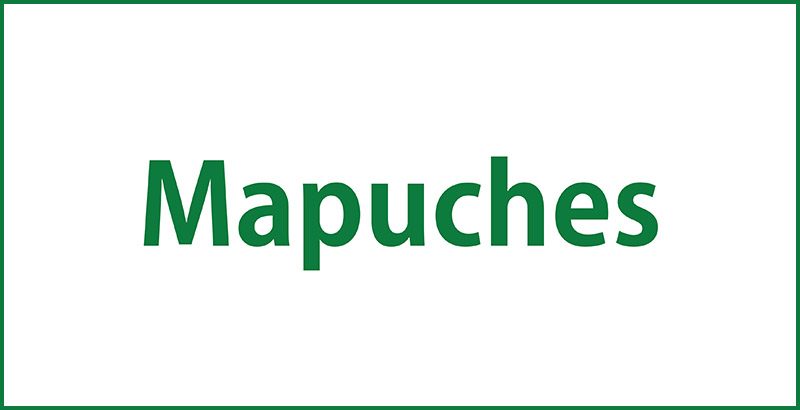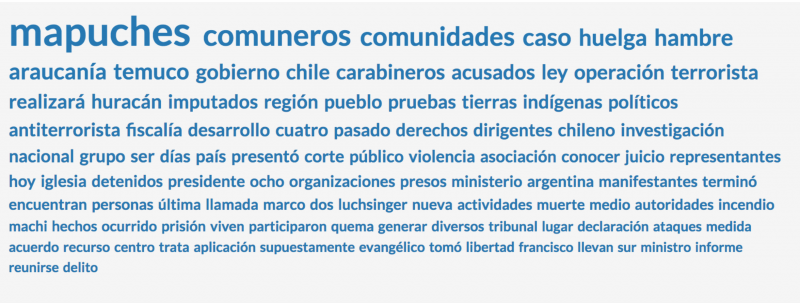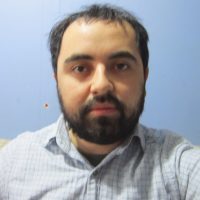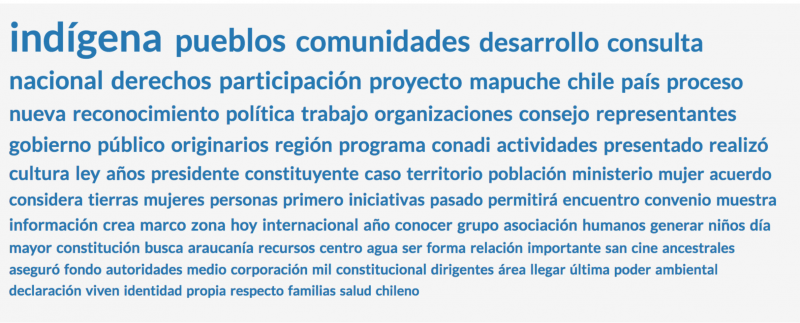“We need a representation that reflects a more autonomous development of Mapuche society”

The Reframed Stories Project asks people to respond to dominant themes and issues that appear in news coverage about their communities. These stories are reflections by people who are frequently represented by others in the media. Word clouds are created using the Media Cloud platform, a data analysis tool which examines a collection of media outlets over a specific period of time, allowing participants to analyze and discuss preliminary insights into how they might be represented in the media. The project refrains from making conclusive pronouncements about the data, and instead is a starting point that creates space for discussion about how they can help shape their own media representation through digital media.
César Pérez, is champuria (Mapuche-Chilean) with roots in Castro (Chiloé) and in Osorno. He holds a bachelor's degree in anthropology and currently working at the Los Lagos University in Osorno, Chile. The following is César's analysis of the word clouds for the terms “indígena” (indigenous) and “Mapuches,” an indigenous group from southern Chile and Argentina.

Dominant words from 1,985 articles published between May 2017 and May 2018 mentioning “Mapuches” within two Media Cloud collections of Chile’s Spanish-language media outlets. (view larger image)

César Pérez
La nube de palabras asociadas a “mapuches” indica claramente una conceptualización marcada por el conflicto. La violencia histórica del Estado chileno hacia el pueblo mapuche aparece aquí, en esta época, bajo la forma de la criminalización de la resistencia. Es decir, ante el avance colonialista, las formas en que el pueblo mapuche ejerce su autonomía y el derecho a la vida son judicializadas. Aquellos que dirigen y participan en movimientos, o que sostienen un discurso de resistencia, son investigados, llevados a tribunales, condenados, en una palabra: perseguidos. La razón detrás de esto es que, por un lado, la resistencia mapuche amenaza con desenmascarar el origen violento del sacramentado estado-nación chileno, y por otro lado, se pone en el camino de proyectos extractivistas de las grandes empresas que están emparentadas con la élite nacional.
The word cloud associated with “mapuches” clearly indicates an understanding that is marked by conflict. At this time, the historical violence towards the Mapuche people by the Chilean State takes the form of the criminalization of resistance. In other words, in the face of the colonial advance, the ways that the Mapuche People exercise their autonomy and the right to life have become judicialized. People that are leading and participating in protest movements or promoting a discourse of resistance are investigated, taken to court, convicted, and in a word — persecuted. On the one hand, the reason behind this is the Mapuche resistance threatens to unmask the violent origin of the “sacred” nation-state of Chile and, on the other hand, it gets in the way of extraction projects by large companies that are related to the national elite.

Dominant words from 2,957 articles published between May 2017 and May 2018 mentioning “indígena” (indigenous) within two Media Cloud collections of Chile’s Spanish-language media outlets. (view larger image)
Ahora, si uno observa la nube de palabras asociadas a “indígenas”, el tono cambia de inmediato. Aquí aparecen de inmediato palabras más positivas, tales como: desarrollo, consulta, derechos, participación, reconocimiento. Sin embargo, el hecho mismo de que estén asociadas al concepto de “indígenas” esconde un interés ya no tan noble, ya que es una palabra que despersonaliza a los pueblos a los que se refiere. Es una palabra que surge de la caracterización homogeneizante y reificadora de parte del Estado chileno a los pueblos preexistentes en este territorio. Y las palabras asociadas entonces pasan a tener otro valor: el del paternalismo, de la mitigación maquiavélica del conflicto histórico, de la asimilación, etcétera.
Frente a esta realidad mediática, ¿qué palabras preferiría que se asocien al pueblo mapuche? En mi opinión, hace falta una representación que refleje un desenvolvimiento más autónomo de la sociedad mapuche, que no esté siempre supeditada a la relación con el Estado chileno. Aquí cabrían palabras como sociedad, idioma, cultura, e incluso palabras que pasarían cada vez más a ser préstamos del mapudungun al castellano, como, por ejemplo: trawün, we tripantu o lofche. Aunque se dice que el lenguaje crea realidad, pienso que no se puede esperar que los medios por sí solos cambien la realidad. Son procesos complejos de cambio social y cultural, por lo que tenemos que seguir luchando por ir transformando la realidad actual. Así, los medios que vayamos generando de manera más autónoma tendrían la doble función de coadyuvar en estos procesos y al mismo tiempo reflejar el resultado de los mismos.
Now, if one observes the word cloud associated with “indigenous”, the tone changes immediately. Here, more positive words appear such as: development, consultation, rights, participation, recognition. However, the very fact that they are associated with the concept “indigenous” hides an interest that is no longer so noble, since it is a word that depersonalizes the peoples to whom it refers. It is a word that emerges from the homogenized and reified characterization of the pre-existing peoples in this territory by the Chilean State. The associated words then come to have another value: that of paternalism, of the Machiavellian mitigation of historical conflict, of assimilation, and so on.
Faced with this media reality, what words would you prefer to associate with the Mapuche people? In my opinion, we need a representation that reflects a more autonomous development of Mapuche society, which is not always contingent upon the relationship with the Chilean State. Here, words such as society, language, culture, and even words that are more frequently becoming Mapudungun loan words to Spanish such as trawün, we tripantu or lofche. Although it is said that language creates reality, I think that the media can not be expected to change reality by itself. They are complex processes of social and cultural change, so we have to keep fighting to transform our current reality. Thus, the media that we autonomously create would have a double function of contributing to these processes and at the same time reflecting their results.
This is part of a Rising Frames series developed as part of an activity organized by Fernando Carías. He helped organize a workshop held on May 26, 2018 in Osorno, Chile that brought together representatives from various collectives and groups to examine how they or issues they care about are represented in a Chilean media collection and created stories in response to that representation.











